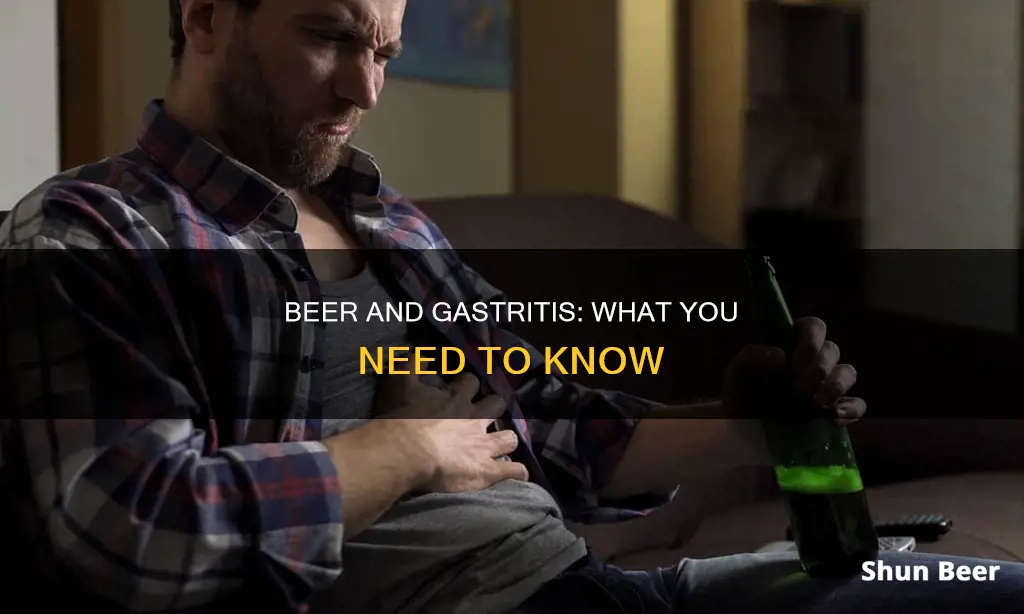
Gastritis is a condition where the stomach's inner lining is inflamed or worn down, and it can be caused by various factors, including alcohol consumption. Alcoholic gastritis occurs when the inflammation is a direct result of drinking alcohol. Beer is an alcoholic beverage, and as such, it can irritate the stomach lining and trigger gastritis symptoms. However, the link between beer consumption and gastritis is not entirely clear, and some studies suggest that excessive beer drinking may not be the primary cause of chronic gastritis. Nonetheless, it is generally recommended that individuals with gastritis avoid alcohol or drink in moderation to prevent worsening their condition.
| Characteristics | Values |
|---|---|
| Can beer cause gastritis? | Excessive beer drinking does not seem to cause chronic gastritis. |
| Can you drink beer if you have gastritis? | It is recommended to avoid alcohol or drink it in moderation if you have gastritis. |
| What is gastritis? | Inflammation or swelling of the stomach lining. |
| What causes gastritis? | Thinning of the stomach lining due to advanced age or a weakened immune system, ingesting medicines like aspirin, the presence of Helicobacter pylori bacteria, etc. |
| What are the symptoms of gastritis? | Pain or burning in the upper abdominal region, diarrhea, nausea, vomiting, excessive belching, a funny taste in the mouth, etc. |
| What happens if gastritis is left untreated? | It can lead to bleeding in the stomach, the development of stomach ulcers, and even stomach cancer. |
What You'll Learn

Alcoholic gastritis symptoms
Alcoholic gastritis is the inflammation of the stomach lining caused by alcohol consumption. It can be acute, a short, isolated incident that often heals on its own, or chronic, a long-lasting form of gastritis that is more likely to cause other health problems. Alcoholic gastritis can be caused by drinking too much, too often, allowing alcohol to irritate and erode the stomach lining.
- Fatigue and weakness, which can be caused by anemia, or too few red blood cells, due to bleeding in the stomach.
- A gnawing, burning ache in the stomach, which may get better or worse after eating or drinking.
- A constant pain between the navel and ribs.
- Belching and hiccupping.
- Bloating or a full feeling in the stomach, which gets worse after eating or drinking.
- Nausea and vomiting, which may be severe.
- Black or tarry stools, which can indicate bleeding in the stomach.
- Vomiting blood or material that looks like coffee grounds, another sign of bleeding in the stomach.
If you are experiencing any of these symptoms, it is important to consult a healthcare professional for a proper diagnosis and treatment plan.
Working with Beer Distributors: Strategies for Mutual Success
You may want to see also

Alcohol's effect on the gastrointestinal tract
Alcohol can have a detrimental effect on the gastrointestinal tract. The gastrointestinal tract plays a particularly important role in mediating alcohol's effects on the body and its health. Firstly, the gastrointestinal tract is the site of alcohol absorption into the bloodstream and, to a lesser extent, of alcohol breakdown and production.
Alcohol can impair the function of the muscles separating the oesophagus from the stomach, increasing the occurrence of heartburn. It can also damage the mucosal lining of the oesophagus, increasing the risk of oesophageal cancer. In the stomach, alcohol interferes with gastric acid secretion and the activity of the muscles surrounding it. It can also induce acute gastric mucosal injury and interfere with gastric and intestinal motility.
Alcohol may impair the muscle movement in the small and large intestines, contributing to the diarrhoea frequently observed in alcoholics. It also inhibits the absorption of nutrients in the small intestine and increases the transport of toxins across the intestinal walls, which may contribute to alcohol-related damage to the liver and other organs.
Alcohol can also cause mucosal injuries, especially in the upper small intestine, which allow large molecules such as endotoxin and other bacterial toxins to pass more easily into the blood or lymph. These toxic substances can have harmful effects on the liver and other organs.
Alcohol consumption can also cause a variety of medical problems, including a loss of appetite, nausea, vomiting, feelings of fullness, flatulence, and abdominal pain. It also plays a role in the development of cancers of the gastrointestinal tract, including the tongue, larynx, pharynx, and oesophagus.
Beer Chillers: How Do They Work?
You may want to see also

The link between gastritis and stomach cancer
Drinking alcohol can irritate the stomach lining and make it more prone to damage. Beer is an alcoholic drink, and so drinking it can cause gastritis. However, according to one source, excessive beer drinking does not seem to cause chronic gastritis.
Gastritis is an inflammation, irritation, or erosion of the stomach lining. It can be acute (short-term) or chronic (long-term). It is often caused by an infection, too much alcohol, or medications that irritate the stomach. In rare cases, long-term gastritis can cause the cells in the stomach lining to restructure themselves and resemble a different type of tissue. This is called gastric intestinal metaplasia, and it is considered precancerous, meaning it can increase the risk of developing stomach cancer.
Gastric intestinal metaplasia is a rare condition in which chronic gastritis leads to changes in the cells of the stomach lining, increasing the risk of stomach cancer. Gastric intestinal metaplasia is not cancerous, but it is a precursor to it. It is important to note that not everyone with gastritis will develop gastric intestinal metaplasia, and not all cases of gastric intestinal metaplasia will progress to stomach cancer. However, it is a risk factor that should be taken seriously.
Chronic gastritis is associated with a higher risk of developing stomach cancer, specifically adenocarcinoma of the stomach and mucosa-associated lymphoid tissue (MALT) lymphoma. The inflammation and damage to the stomach lining caused by gastritis can lead to cellular changes that increase the likelihood of cancerous growths.
In addition, gastritis can cause peptic ulcers, which are painful sores in the stomach lining that can bleed and scar. Frequent ulcers can cause scarring and narrowing of the stomach opening, leading to digestion problems and pain. Untreated gastritis can also lead to anemia, gastric polyps, and stomach tumours, which may or may not be cancerous.
The Magic Behind Beer Canning: A Step-by-Step Guide
You may want to see also

The impact of beer on gastritis
Gastritis is an inflammation or swelling of the stomach lining. It can be acute or chronic. Acute gastritis is an immediate inflammation of the stomach lining, which tends to be very painful and may cause severe stomach cramping, irritability, and vomiting. Chronic gastritis, on the other hand, is a long-term condition where the stomach lining remains inflamed and is worn down over time. Those with chronic gastritis may only experience minor symptoms due to decreased sensitivity from continued alcohol use.
Alcoholic gastritis is a type of acute gastritis caused by excessive alcohol consumption. Alcohol interferes with the mucus lining of the stomach, leaving it unprotected against corrosive acids. Beer is an alcoholic beverage, and as such, it can contribute to the development and worsening of alcoholic gastritis.
However, it is important to note that the relationship between beer and gastritis may be influenced by other factors as well. For example, beer consumption in moderation may not have the same impact as excessive drinking. Additionally, individual differences in sensitivity to alcohol and other triggers, such as spicy foods or stress, can also play a role in the development and severity of gastritis.
If you are experiencing gastritis, it is generally recommended to avoid alcohol or drink it in moderation. However, this may be challenging for individuals with an alcohol addiction, and professional treatment may be necessary to overcome the addiction and heal gastritis.
Mixing Beer and Xanax: What's the Danger?
You may want to see also

Treatment for alcohol-related gastritis
Alcoholic gastritis is when the inner lining of your stomach becomes inflamed or worn down due to alcohol use. If heavy drinking is the cause of your gastritis, cutting back or quitting alcohol will be part of the treatment.
Medications
Medications can help ease gastritis symptoms. These may include:
- Antibiotics to kill bacteria that cause gastritis
- Antacids to reduce stomach acid
- Histamine (H2) blockers, which curb how much acid your stomach makes
- Proton pump inhibitors, which treat stomach ulcers and reflux
Lifestyle Changes
In addition to cutting back on alcohol, your doctor may recommend that you:
- Avoid spicy foods and acidic beverages like coffee, orange and tomato juices, and colas
- Stop smoking
- Avoid aspirin, caffeine, and over-the-counter pain medications
- Eat smaller meals
Diagnosis
Your doctor will give you a physical exam and ask about your health history and personal habits, including how much and how often you drink. This information may be enough to diagnose gastritis. However, you may also need to undergo the following tests:
- A breath test to check for bacteria that cause gastritis
- An X-ray of your upper gastrointestinal (GI) system
- Upper endoscopy, where a thin, lighted tube with a camera is guided down your throat to check your oesophagus, stomach, and duodenum
- Blood tests to look for bacteria that cause gastritis and for signs of anemia
- A stool test to check your faeces for bacteria that can cause gastritis or for blood, indicating bleeding in the stomach or intestine linings
Risks of Untreated Alcoholic Gastritis
If left untreated, gastritis can lead to serious complications, such as:
- Anemia, caused by bleeding stomach ulcers
- Peptic ulcers, which are painful sores in the upper digestive tract
- Gastric polyps, or clumps of cells on the stomach lining
- Stomach tumours that may or may not be cancerous
Wellbutrin and Beer: Is It Safe to Mix?
You may want to see also
Frequently asked questions
Beer contains alcohol, which is a chemical irritant that can worsen pre-existing inflammation in the stomach lining. Therefore, it is best to avoid drinking beer if you have gastritis.
Gastritis is a condition where the stomach's inner lining is inflamed or worn down. It can be caused by various factors, including alcohol consumption, certain medications, bacterial infections, and autoimmune disorders.
Symptoms of gastritis may include a burning ache or pain in the upper abdominal region, nausea, vomiting, excessive belching, and a constant pain between the navel and ribs.
Gastritis can be treated with over-the-counter medications such as antacids, proton pump inhibitors, and H2 antagonists. In some cases, doctors may prescribe antibiotics or recommend dietary changes, such as avoiding spicy foods and acidic beverages.
If left untreated, alcoholic gastritis can lead to serious complications such as gastrointestinal bleeding, stomach ulcers, and even stomach cancer. Therefore, it is important to seek medical help and reduce alcohol consumption to treat gastritis effectively.







